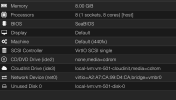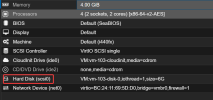Hello,
I have created VM template using packer. Template is working properly, if I use PVE GUI, I can use prepared cloud-init config and deploy it perfectly. However, using terraform with Proxmox plugin from Telmate/proxmox version 3.0.1-rc1, I can create full clone without issue but it always results with unsed disk, the original disk, that is attached to clone. Now I fiddled with it around for some time but just cannot seem to get it to work properly - if I manually attach that cloned disk, everything works but - then that is not automation. Any help?
Here is the config:
And the result:

I have created VM template using packer. Template is working properly, if I use PVE GUI, I can use prepared cloud-init config and deploy it perfectly. However, using terraform with Proxmox plugin from Telmate/proxmox version 3.0.1-rc1, I can create full clone without issue but it always results with unsed disk, the original disk, that is attached to clone. Now I fiddled with it around for some time but just cannot seem to get it to work properly - if I manually attach that cloned disk, everything works but - then that is not automation. Any help?
Here is the config:
Bash:
# Create the wef VM
resource "proxmox_vm_qemu" "wef" {
name = "wef"
target_node = "pxh1"
tags = "test"
vmid = "501"
# Clone from windows 2k19-cloudinit template
clone = "ubuntu-server-focal-template"
os_type = "cloud-init"
# Cloud init options
cloudinit_cdrom_storage = "local-lvm"
ipconfig0 = "ip=dhcp"
memory = 8192
agent = 1
sockets = 1
cores = 8
# Set the boot disk paramters
bootdisk = "virtio"
scsihw = "virtio-scsi-single"
disk {
slot = 0
size = "40G"
type = "virtio"
storage = "local-lvm"
ssd = 1
discard = "on"
} # end disk
# Set the network
network {
model = "virtio"
bridge = "vmbr0"
} # end first network block
# Ignore changes to the network
## MAC address is generated on every apply, causing
## TF to think this needs to be rebuilt on every apply
lifecycle {
ignore_changes = [
network
]
} # end lifecycle
# Cloud-init params
#ipconfig0 = "ip=192.168.2.100/24,gw=192.168.2.1"
#ssh_user = "ubuntu"
#sshkeys = var.ssh_keys
} # end proxmox_vm_qemu wef resource declarationAnd the result:



